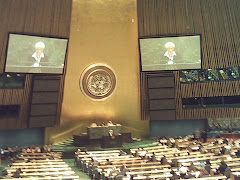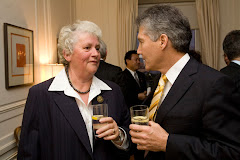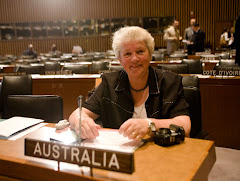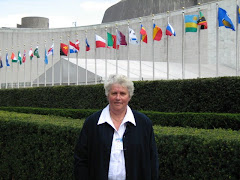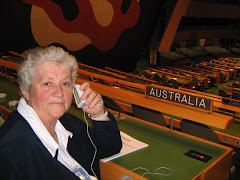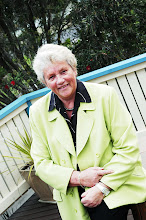Sixty-third General Assembly
First Committee
11th Meeting (PM)
FIGHTING BIOLOGICAL WARFARE TURNS CORNER AS BIOLOGICAL WEAPONS CONVENTION EDGES
CLOSER TO UNIVERSALIZATION, FIRST COMMITTEE HEARS IN THEMATIC DEBATE
Potential of Missiles to Deliver Payload of Mass Destruction Weapons Quickly,
Accurately Makes Them Major Political, Military Issue; Three Related Drafts Tabled
JOANNA GASH ( Australia ), chair of the Australia Group which works with 40 other countries and the European Commission in strengthening chemical and biological export control lists, said that the Chemical Weapons Convention had emerged as a cornerstone of the multilateral non-proliferation and disarmament architecture.
It was crucial to efforts to halt the proliferation of chemical weapons. Australia was encouraged by continuing progress in the destruction of chemical weapons, which had resulted in the verified elimination of more than one third of declared stockpiles. One former possessor State had completed elimination of all chemical weapons. She urged the other five possessor States to make every effort to meet their extended deadlines for destruction.
At the same time, she regretted that the Second Review Conference of the Chemical Weapons Convention in May had experienced a difficult negotiating environment, which had prevented constructive discussion of many of the challenges facing the treaty and, thus, agreement by States parties on how to deal with them.
It was now vital that all of them look to the future to ensure that that Convention adapted to developments in science and technology. “We must continue to strive for the full and effective implementation of declaration and inspection requirements to activities not prohibited by the Convention”, she urged.
Asserting that the Biological Weapons Convention was strengthening global defences against biological weapons and bioterrorism, she noted the strides made by the Convention, with an increase from 155 to 162 State parties with an additional 13 signatories.
She congratulated the three States that had acceded to the Convention this year -- Zambia, Madagascar and the United Arab Emirates.
Despite those monumental steps, more needed to be done to counter weapons of mass destruction delivery systems, especially absent an international treaty covering ballistic missile proliferation.
Australia and the Republic of Korea would submit a resolution on the prevention of illicit brokering -- black market activity -- by which the perpetrators sought to avoid the restrictions set out in the Biological and Chemical Weapons Conventions and the export control regimes.
Tuesday, October 21, 2008
Monday, October 20, 2008
You never know what to expect at the UN
What I thought was to be a relelatively quiet week at the UN turned out to have some very interesting meetings, and one that allowed me to make another speech in regards to Weapons of Mass Destruction and the elimination of same.
The General Assembly also voted on fiveextra countries to represent the security council, Australia will be applying for a place in 2013.
Was priviledged to sit in on a youth meeting organised by Holland and Australia. We often hear about the negative stories about our young people, well I need to say how proud I was of all the delegates from about 20 different countries who took part. It is a pity that we pollies don,t get to hear of these types of discussions. The average age of the delegates were 17-22, so as I said I felt very honoured to have been asked to attend.
On the weekend I made another trip to ground zero to get a closer look at the new "Freedom Tower" being built to replace the Twin Towers. I still find it hard to comprehend the enormity of it all. There are still some buildings near it that have still not been re occupied. Whilst there I went to Wall Street, heart of the finance sector. People are still wandering around shaking their heads asking "How did this all happen"
My Labor collegue and I invited some of the interns at the Aust. mission over for dinner. Again these young adults have travelled far and wide, some as volunteers, all in order to advance and increase their job prospects and to gain knowledge from aound the world.
Today Sunday. I have just returned from volunteering at a "soup kitchen" in near the Harlem area, run by St.Johns Church of the Divine, don't think I have ever cut up as much fruit salad ... and my dishwashing skills are still there from my hospitality days. It certainly brought home to other side of New York.
I am still finding that walking is much quicker than the bus, and I really do enjoy seeing the people and trying to guess what and where they might work.
The General Assembly also voted on fiveextra countries to represent the security council, Australia will be applying for a place in 2013.
Was priviledged to sit in on a youth meeting organised by Holland and Australia. We often hear about the negative stories about our young people, well I need to say how proud I was of all the delegates from about 20 different countries who took part. It is a pity that we pollies don,t get to hear of these types of discussions. The average age of the delegates were 17-22, so as I said I felt very honoured to have been asked to attend.
On the weekend I made another trip to ground zero to get a closer look at the new "Freedom Tower" being built to replace the Twin Towers. I still find it hard to comprehend the enormity of it all. There are still some buildings near it that have still not been re occupied. Whilst there I went to Wall Street, heart of the finance sector. People are still wandering around shaking their heads asking "How did this all happen"
My Labor collegue and I invited some of the interns at the Aust. mission over for dinner. Again these young adults have travelled far and wide, some as volunteers, all in order to advance and increase their job prospects and to gain knowledge from aound the world.
Today Sunday. I have just returned from volunteering at a "soup kitchen" in near the Harlem area, run by St.Johns Church of the Divine, don't think I have ever cut up as much fruit salad ... and my dishwashing skills are still there from my hospitality days. It certainly brought home to other side of New York.
I am still finding that walking is much quicker than the bus, and I really do enjoy seeing the people and trying to guess what and where they might work.
Wednesday, October 15, 2008
UN Statement October 14, 2008
October 14
SPACE TECHNOLOGIES INDISPENSABLE TO CHALLENGES OF CLIMATE CHANGE, FOOD SECURITY,
HEALTH, FOURTH COMMITTEE HEARS DURING DEBATE ON PEACEFUL USES OF OUTER SPACE
Space Technology Like Double-Edged Sword -- It Could Serve World or Inflict
Devastating Harm, Delegates Also Told, With Many Opposing Militarization of Space
JOANNA GASH ( Australia) said that concerns over global food security had arisen out of a complex set of drivers that influenced both food supply and demand, including population growth, dietary changes associated with economic development, climate variability and the diversion of food commodities to biofuels. Space-based observations would play a critical role in all of those food supply issues through the use of remote sensing to characterise productivity constraints, raise resource efficiency, and improve agricultural yield.
Providing numerous examples of how space technologies were currently supporting a range of Australian research programmes, she said that Australia was seeking to maintain and grow the productivity and sustainability of its farming systems. While Australian agriculture faced significant challenges in terms of climate variability and change, Australian agricultural research and development was making active use of remote sensing to search for more efficient resource use and sustainable land management. Her country was also engaging in a range of international partnerships to apply remotely sensed information to the management of global resources and address the food security challenge.
She said her country was looking to improve its investment in agriculture research, in order to lift agricultural productivity. Precision images projected from satellites made it possible to predict changes in crop yields, measure sea surface temperatures and track bush fires. Global positioning systems allowed the further development of precision agriculture and could reduce costs, increase production and improve the sustainability of agricultural practices. Space technologies were becoming increasingly vital for the accurate and efficient management of national resources, and it was important that they were also made accessible to developing and least-developed countries to help them reach their development potential.
SPACE TECHNOLOGIES INDISPENSABLE TO CHALLENGES OF CLIMATE CHANGE, FOOD SECURITY,
HEALTH, FOURTH COMMITTEE HEARS DURING DEBATE ON PEACEFUL USES OF OUTER SPACE
Space Technology Like Double-Edged Sword -- It Could Serve World or Inflict
Devastating Harm, Delegates Also Told, With Many Opposing Militarization of Space
JOANNA GASH ( Australia) said that concerns over global food security had arisen out of a complex set of drivers that influenced both food supply and demand, including population growth, dietary changes associated with economic development, climate variability and the diversion of food commodities to biofuels. Space-based observations would play a critical role in all of those food supply issues through the use of remote sensing to characterise productivity constraints, raise resource efficiency, and improve agricultural yield.
Providing numerous examples of how space technologies were currently supporting a range of Australian research programmes, she said that Australia was seeking to maintain and grow the productivity and sustainability of its farming systems. While Australian agriculture faced significant challenges in terms of climate variability and change, Australian agricultural research and development was making active use of remote sensing to search for more efficient resource use and sustainable land management. Her country was also engaging in a range of international partnerships to apply remotely sensed information to the management of global resources and address the food security challenge.
She said her country was looking to improve its investment in agriculture research, in order to lift agricultural productivity. Precision images projected from satellites made it possible to predict changes in crop yields, measure sea surface temperatures and track bush fires. Global positioning systems allowed the further development of precision agriculture and could reduce costs, increase production and improve the sustainability of agricultural practices. Space technologies were becoming increasingly vital for the accurate and efficient management of national resources, and it was important that they were also made accessible to developing and least-developed countries to help them reach their development potential.
UN Statement October 13, 2008
October 13, 2008
ADDRESSING GENERAL ASSEMBLY, PRESIDENTS OF TRIBUNALS FOR RWANDA, FORMER YUGOSLAVIA
APPEAL FOR TIME TO WRAP UP PENDING CASES, COOPERATION ON OUTSTANDING FUGITIVES
Assembly also Wraps up Consideration of Second Annual
Reports of Peacebuilding Commission and Peacebuilding Fund
JOANNA GASH (Australia) said the Commission's success would depend "in no small part" on the active engagement of its Chairperson and the Chairs of the country-specific configurations. In the last year, the Commission had moved beyond its initial procedural difficulties to develop more effective working methods, and the agenda had expanded to include Guinea-Bissau and the Central African Republic. It had tackled important substantive issues, including the role of the private sector.
Through the Peacebuilding Fund, $86 million had been allocated to projects in countries on the agenda, and Australia supported use of the Fund as a catalytic tool to ensure the immediate release of resources. She was equally encouraged that bilateral and multilateral donors had supplemented those efforts with targeted assistance, and that the Commission continued to work in a flexible manner.
At the same time, the challenges ahead were significant and the Commission must continue to refine its approach, she said. The country specific configurations, in particular, must improve their tools, while the monitoring mechanisms must be refined to include specific indicators and benchmarks, and strategic frameworks should continue to adapt to local conditions. Further, the Commission must ensure that concrete experience with such issues as elections and land reform translated into a wider body of knowledge that informed future efforts. In closing, she noted that more than half of States emerging from conflict relapsed within 10 years. While it was too early to judge the Commission, there was reason for optimism with its progress to date.
ADDRESSING GENERAL ASSEMBLY, PRESIDENTS OF TRIBUNALS FOR RWANDA, FORMER YUGOSLAVIA
APPEAL FOR TIME TO WRAP UP PENDING CASES, COOPERATION ON OUTSTANDING FUGITIVES
Assembly also Wraps up Consideration of Second Annual
Reports of Peacebuilding Commission and Peacebuilding Fund
JOANNA GASH (Australia) said the Commission's success would depend "in no small part" on the active engagement of its Chairperson and the Chairs of the country-specific configurations. In the last year, the Commission had moved beyond its initial procedural difficulties to develop more effective working methods, and the agenda had expanded to include Guinea-Bissau and the Central African Republic. It had tackled important substantive issues, including the role of the private sector.
Through the Peacebuilding Fund, $86 million had been allocated to projects in countries on the agenda, and Australia supported use of the Fund as a catalytic tool to ensure the immediate release of resources. She was equally encouraged that bilateral and multilateral donors had supplemented those efforts with targeted assistance, and that the Commission continued to work in a flexible manner.
At the same time, the challenges ahead were significant and the Commission must continue to refine its approach, she said. The country specific configurations, in particular, must improve their tools, while the monitoring mechanisms must be refined to include specific indicators and benchmarks, and strategic frameworks should continue to adapt to local conditions. Further, the Commission must ensure that concrete experience with such issues as elections and land reform translated into a wider body of knowledge that informed future efforts. In closing, she noted that more than half of States emerging from conflict relapsed within 10 years. While it was too early to judge the Commission, there was reason for optimism with its progress to date.
Wednesday, October 8, 2008
Australian School visits the UN
Last week I had a visit from Riverview Boys High School from Sydney. They asked me to show them around the UN. Whilst the school is not in my electorate, the parents from one of the teachers lives at Culburra Beach. It was not until the 18 boys and 3 teachers saw the magnitude of the General Assembly that they really understood the enormity of so many countries coming together on the world stage.
This week started with a very powerful meeting of the first committee where the Australian Ambassador made a strong speech on our stance on Disarmament and international security.
Also met with Prof. Ronald McCallum AO who is our candidate for Australia for the UN committee on the Right of Persons with Disabilities. Prof.McCallum is an extraordinary and inspiring person who is blind and yet amongst many other interests is also a Professor at the Faculty of Law at the University of Sydney. Lots of lobbying going on amongst other countries to see him elected.
Today Tuesday, I was at a meeting where the first lady of the United States, Laura Bush, was guest speaker. She is passionate about literacy and development. Mrs Bush was a former teacher and librarian. One of her comments that stuck in my mind was a quote from a young African man who had been taught how to read and said"now I don't have to go and find the world - the world can now come to me"
This week started with a very powerful meeting of the first committee where the Australian Ambassador made a strong speech on our stance on Disarmament and international security.
Also met with Prof. Ronald McCallum AO who is our candidate for Australia for the UN committee on the Right of Persons with Disabilities. Prof.McCallum is an extraordinary and inspiring person who is blind and yet amongst many other interests is also a Professor at the Faculty of Law at the University of Sydney. Lots of lobbying going on amongst other countries to see him elected.
Today Tuesday, I was at a meeting where the first lady of the United States, Laura Bush, was guest speaker. She is passionate about literacy and development. Mrs Bush was a former teacher and librarian. One of her comments that stuck in my mind was a quote from a young African man who had been taught how to read and said"now I don't have to go and find the world - the world can now come to me"
Saturday, October 4, 2008
A day of catching up
New York seems (so they tell me) returned to normal, far less security and traffic around. The talk is still centred around Wall st. and the pending elections.
Wednesday, October 1, 2008
GRIDLOCK
It’s said that the population of the Shoalhaven swells to three times its usual size during the Christmas holidays. And while it’s been happening for many years, locals are still taken back by the sudden and dramatic increase in people traffic during December and January each year.
Well, apparently it’s a similar dynamic to "Noo Yorkers" when the United Nations is in session, but on a much grander scale. Talk about lock down – you can get to your destination faster on foot than by taxi, when it eventually moves.
I suppose it can be compared to Canberra when Parliament sits. The amount of people associated with a UN sitting is truly astronomical and all these are concentrated in this great city for three months.
The security effort has to be seen to be believed. To quote a New York Times columnist who wrote somewhat tongue in cheek; “It was SUVs with tinted windows. Cops on horseback. Cops in cars. Cops on foot. Cops on rooftops. Cops chatting up other cops in the crosswalk. Secret Service guys in dark suits. Dark glasses. Dark expressions. Dark cars. Buttons on their lapels. Talking nonstop into their cuffs. Boy, did they blend into the crowd”.
For a city with a population of just under half that of Australia, concentrated in a land mass about two thirds less than that of Gilmore, you can appreciate the impact on the nerves of New Yorkers.
That is why my world is increasingly becoming limited to the UN Building and the street that takes me to my apartment a few blocks away. There is so much to be done in what is turning out to be a very short space of time.
Well, apparently it’s a similar dynamic to "Noo Yorkers" when the United Nations is in session, but on a much grander scale. Talk about lock down – you can get to your destination faster on foot than by taxi, when it eventually moves.
I suppose it can be compared to Canberra when Parliament sits. The amount of people associated with a UN sitting is truly astronomical and all these are concentrated in this great city for three months.
The security effort has to be seen to be believed. To quote a New York Times columnist who wrote somewhat tongue in cheek; “It was SUVs with tinted windows. Cops on horseback. Cops in cars. Cops on foot. Cops on rooftops. Cops chatting up other cops in the crosswalk. Secret Service guys in dark suits. Dark glasses. Dark expressions. Dark cars. Buttons on their lapels. Talking nonstop into their cuffs. Boy, did they blend into the crowd”.
For a city with a population of just under half that of Australia, concentrated in a land mass about two thirds less than that of Gilmore, you can appreciate the impact on the nerves of New Yorkers.
That is why my world is increasingly becoming limited to the UN Building and the street that takes me to my apartment a few blocks away. There is so much to be done in what is turning out to be a very short space of time.
Subscribe to:
Comments (Atom)
